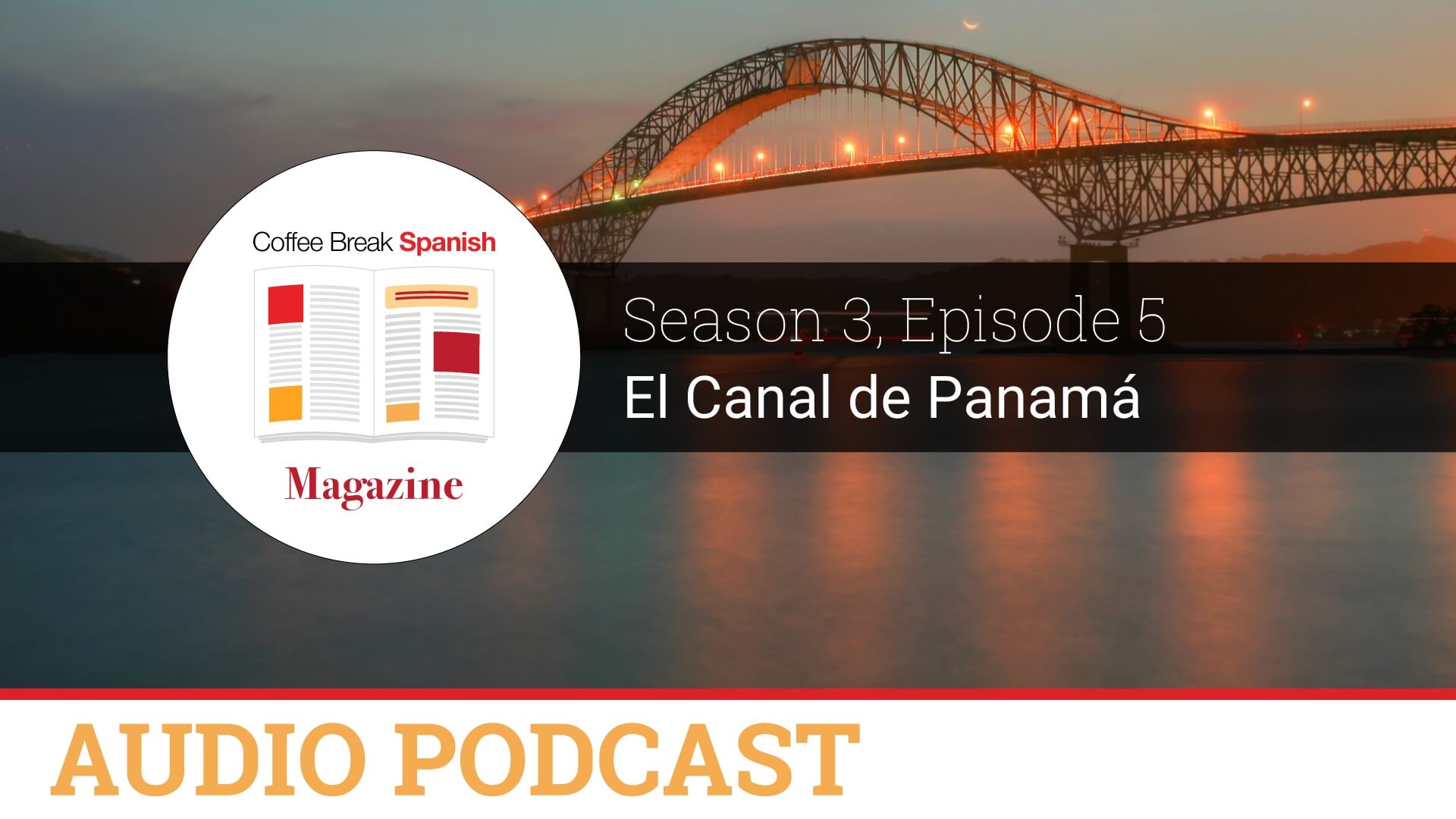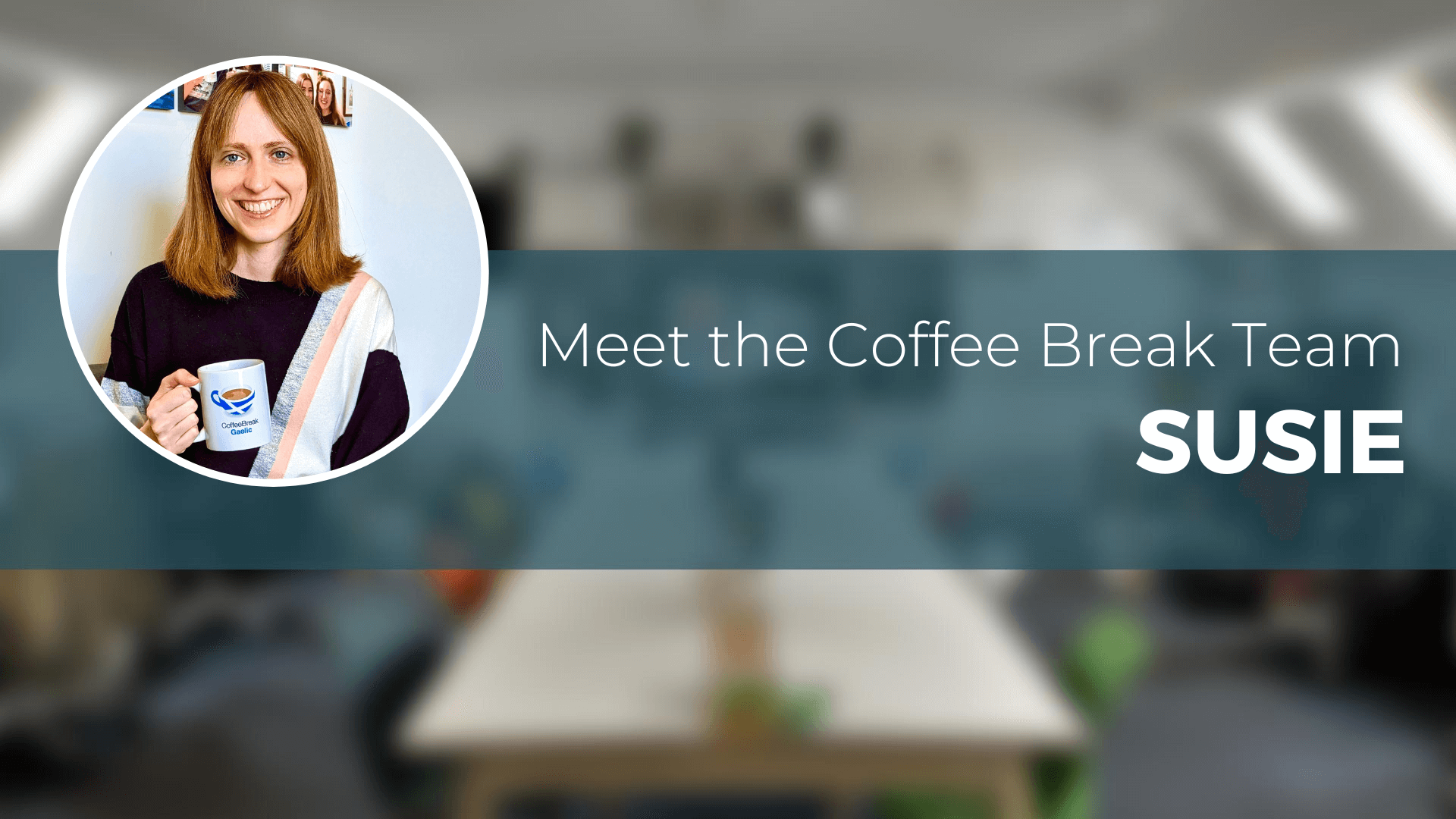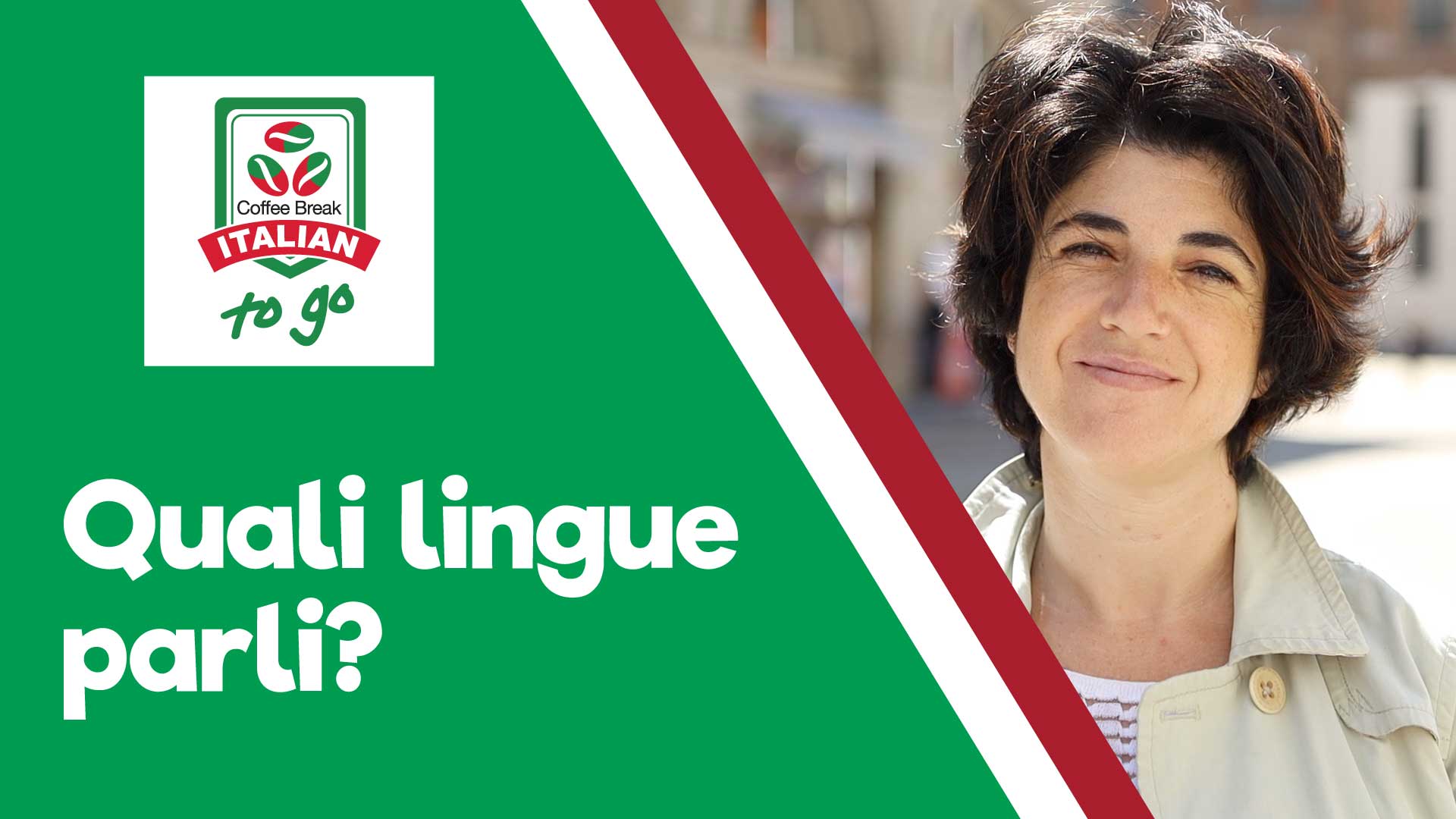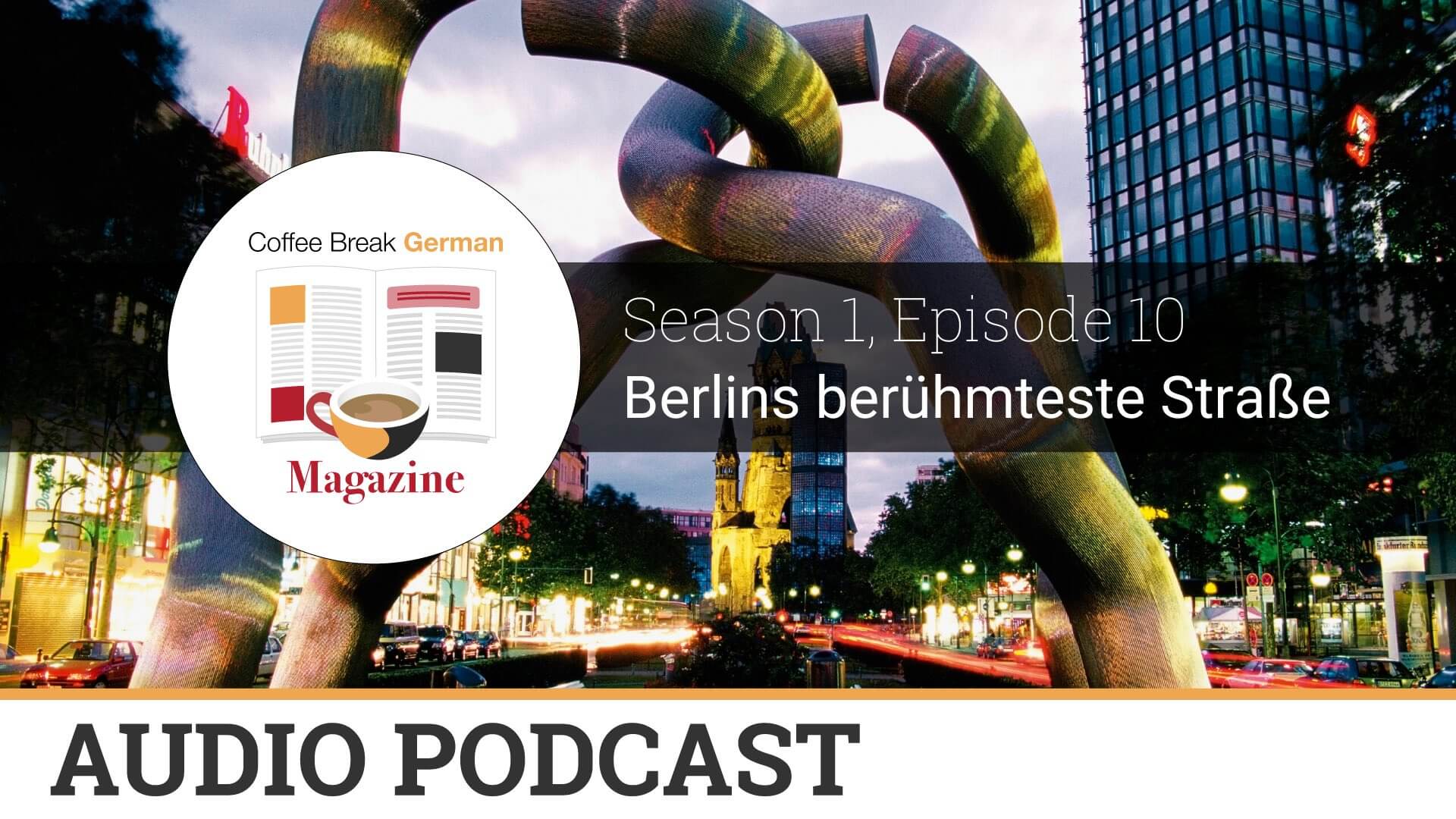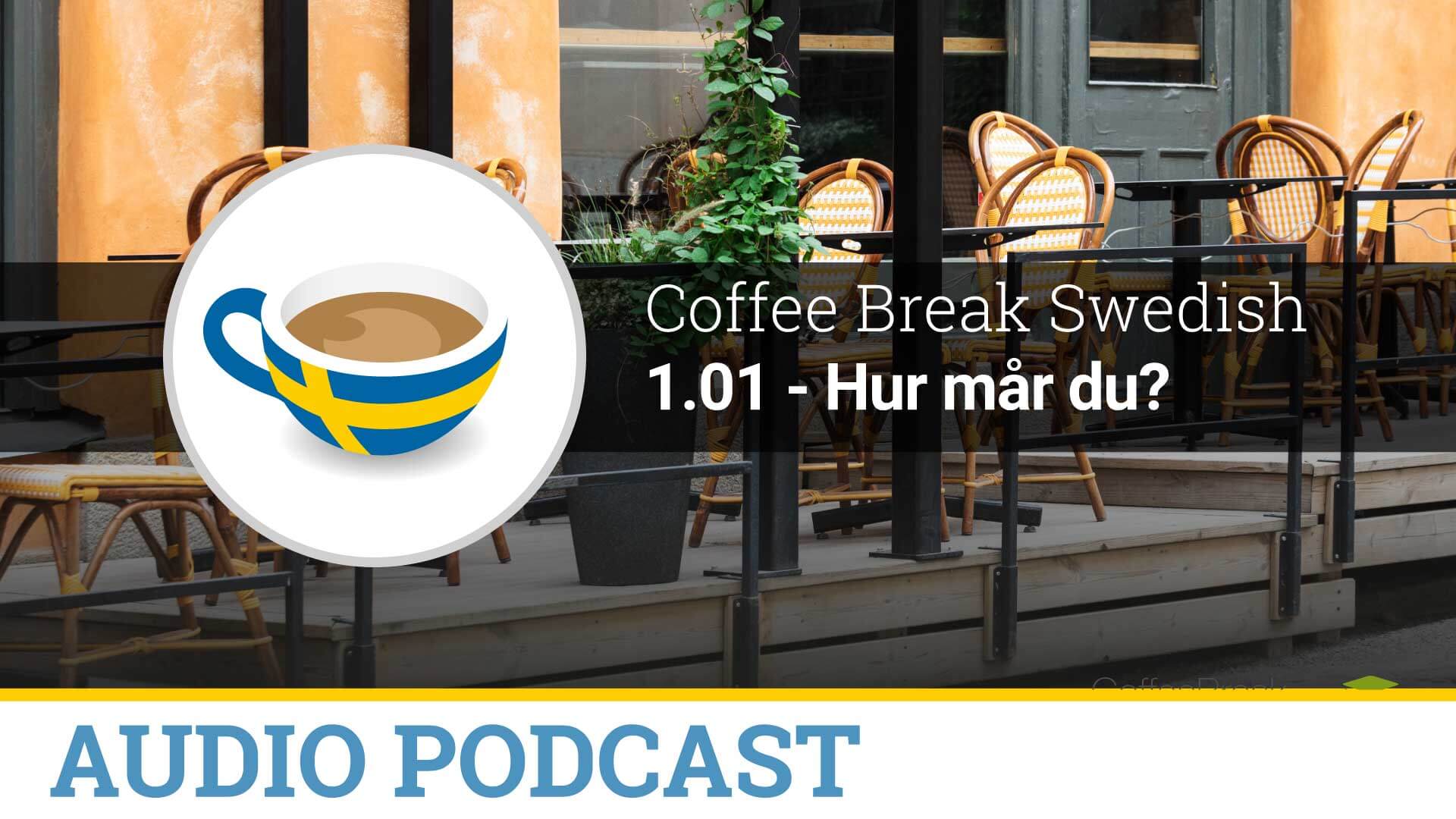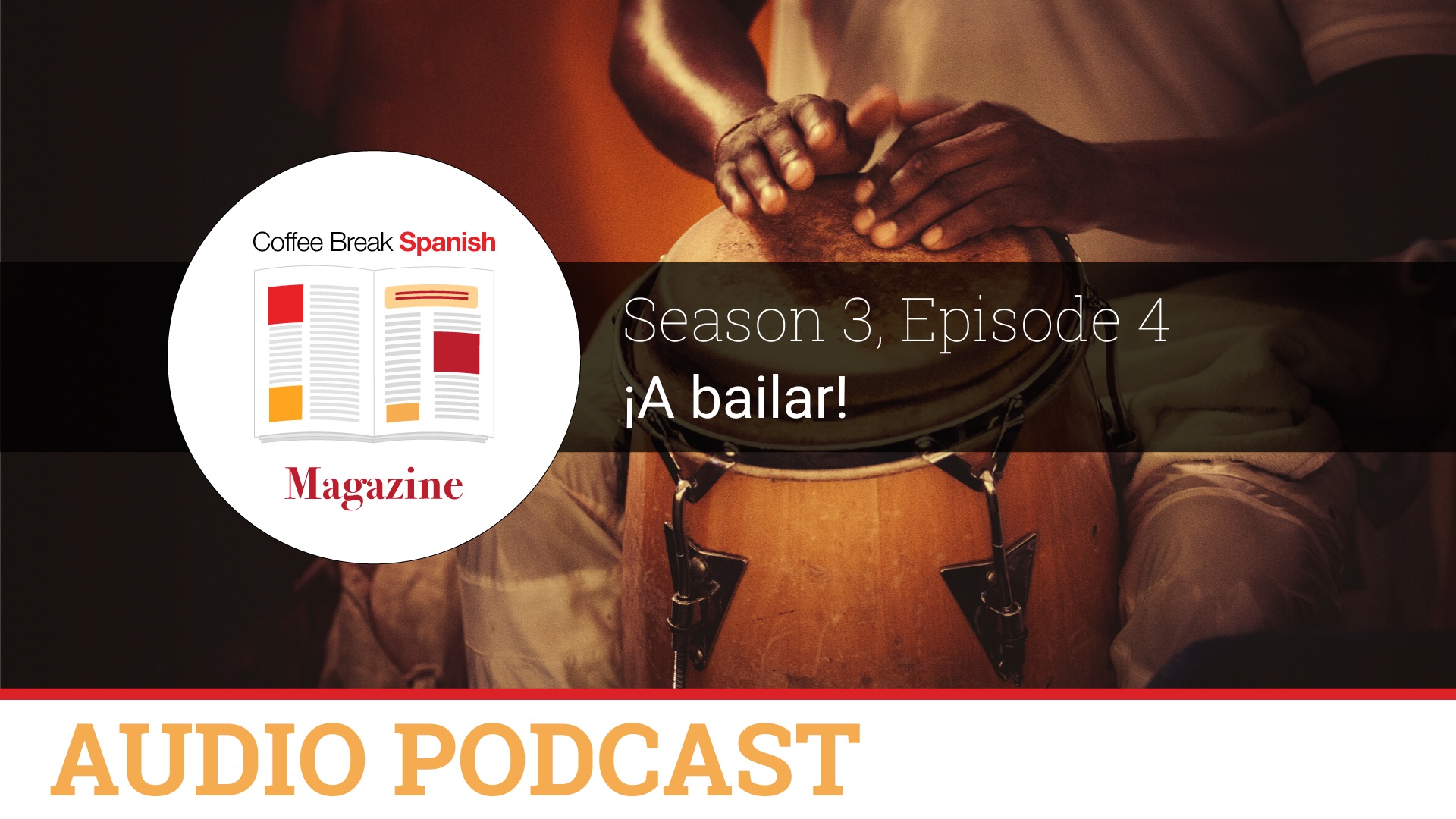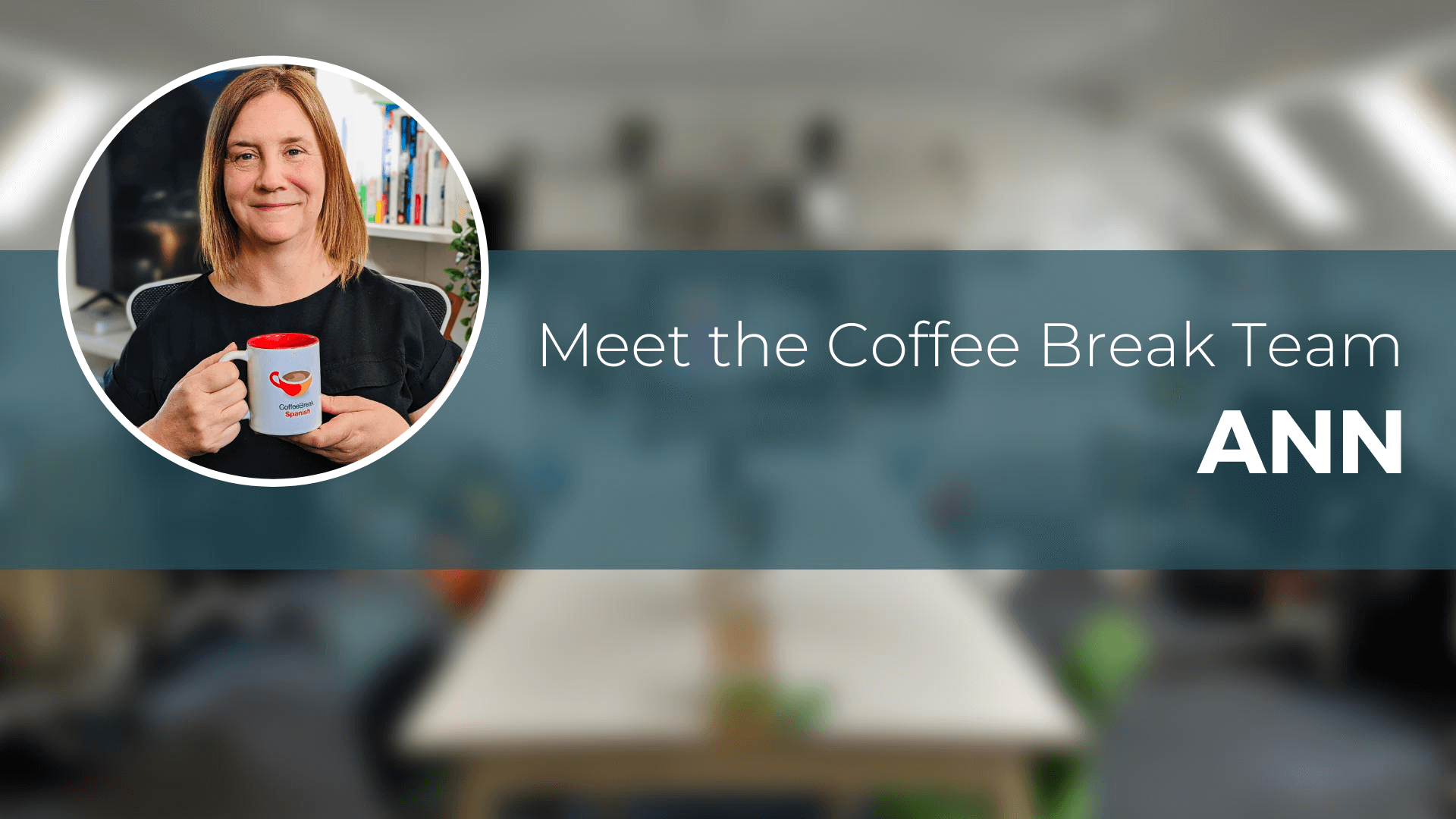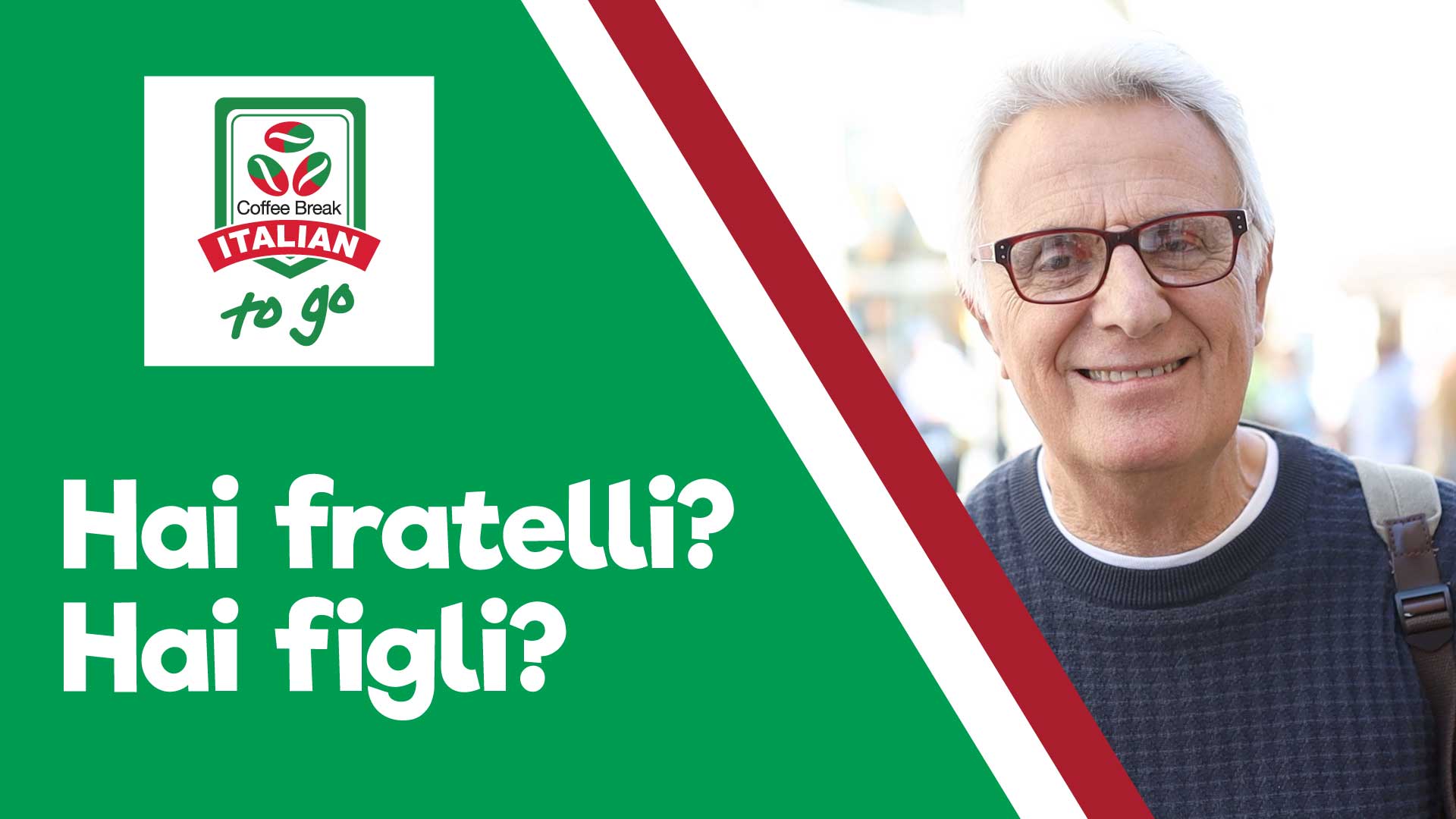Join Fernanda, Sofía and Mark in the latest episode of the Magazine as they discuss the story behind the impressive Panama Canal. Listener Jean asks a question about pronunciation and Sofía shares some Panamanian colloquialisms.
Month: January 2020
Meet the team: Susie
Hi! My name is Susie and I started working as a Curriculum Developer for Radio Lingua in 2018. I’m from Glasgow originally but I grew up in Strasbourg in France and I speak English, French, and Scottish Gaelic.

What is your role in Coffee Break?
I develop learning materials for Coffee Break French and Coffee Break Gaelic, such as lesson notes, and audio and video content. I also give online feedback to learners taking part in the French Masterclass.
What experience have you had speaking and learning other languages?
I was brought up in a multicultural and multilingual environment in Strasbourg in France. I attended an international school where I was educated bilingually in English and French. I also learned German and Spanish at school and studied Scottish Gaelic at university. Since graduating, I have used languages in many different jobs including transcription, translation, teaching, interpreting and academic research.
What are your favourite memories of working with Coffee Break?
I’ve really enjoyed working on the content for the French and Gaelic podcasts. It’s great to see all the elements come together to produce the recordings! I also enjoy all the chats about language we have in the office!
Where would your ideal coffee break be and with whom?
My ideal coffee break would be a café au lait with a croissant fourré at one of the local cafés in Strasbourg with my family.
What’s your best language-learning tip?
Read and listen to the language you’re learning whenever you can. Watch films and TV shows in that language. The more you see and hear the language, the better!
Quick-fire round
Favourite Language: French and Gaelic
Favourite word/phrase in the language: In Gaelic, sìde nan seachd sian which literally means “weather of the seven elements” and is used to describe changeable Scottish weather. In French, n’importe quoi – I love this expression because there isn’t really an equivalent in any other language I know!
Favourite film: One of my favourite French films is La Fille du Puisatier
Favourite book: Two of my favourite French books are Un Long Dimanche de Fiançailles by Sebastien Japrisot and Le Très-Bas by Christian Bobin.
Favourite destination: Ayrshire in Scotland, Alsace in France and Galway in Ireland
Do you have a message for the Coffee Break community?
Learning a language is one of the most worthwhile things you can do. An understanding of language gives you more than just the ability to communicate. It gives you new ways of viewing the world around you.
Quelles langues parles-tu ? / Quelles langues parlez-vous ? – Coffee Break French To Go Episode 8
To ask “which languages do you speak?” in French you can say quelles langues parles-tu ?, or in a more formal situation, quelles langues parlez-vous ? In this episode of Coffee Break French To Go, Pierre-Benoît asks this questions to interviewees in the streets of his hometown, Pornic. You can use the answers of our interviewees to help you learn to answer this question yourself.
In the first part of the video, watch the interviews without subtitles and try to understand. In the second part of the video, we’ve provided subtitles in French at the top of the screen. You can choose to turn on subtitles in English using the Subtitles/CC button.
In this first series of Coffee Break French To Go, Pierre-Benoît is in the town of Pornic, in the west of France, and in each episode she’ll ask passers-by one question. Of course, that one question will result in many answers, and it’s through these answers that you can practise your French and build your vocabulary.
Coffee Break French To Go will be published every two weeks here on YouTube, and each Season will be filmed in a different part of the French-speaking world.
If you’d prefer not to wait for all 10 lessons of Season 1 to be published, you can access downloadable versions of the videos along with audio versions and lesson notes / transcripts in the Coffee Break Academy.
Coffee Break French To Go is based on the popular podcast series and online course Coffee Break French. For access to the free podcasts, please click here.
To purchase our full online courses on the Coffee Break Academy, click here.
Quali lingue parli? – “Which languages do you speak?” – Coffee Break Italian To Go Episode 8
To ask “which languages do you speak?” in Italian you can say quali lingue parli?, or in a more formal situation, quali lingue parla? In this episode of Coffee Break Italian To Go, Francesca asks this question to interviewees in the streets of Milan. You can use the answers of our interviewees to help you learn to answer this question yourself.
In the first part of the video, watch the interviews without subtitles and try to understand. In the second part of the video, we’ve provided subtitles in Italian at the top of the screen. You can choose to turn on subtitles in English using the Subtitles/CC button.
In this first series of Coffee Break Italian To Go, Francesca is in the town of Milan, in the north of Italy, and in each episode she’ll ask passers-by one question. Of course, that one question will result in many answers, and it’s through these answers that you can practise your Italian and build your vocabulary.
Coffee Break Italian To Go will be published every two weeks here on YouTube, and each Season will be filmed in a different part of the Italian-speaking world.
If you’d prefer not to wait for all 10 lessons of Season 1 to be published, you can access downloadable versions of the videos along with audio versions and lesson notes / transcripts in the Coffee Break Academy.
Coffee Break Italian To Go is based on the popular podcast series and online course Coffee Break Italian. For access to the free podcasts, please click here.
To purchase our full online courses on the Coffee Break Academy, click here.
CBG Mag 1.10 | Berlins berühmteste Straße
We’ve reached the final episode in this season of the Coffee Break German Magazine. Join Andrea and Mark for one last time as they discuss Berlin’s most famous street. We also hear from listener, Andrew who is looking for some tips on pronunciation. To finish, Olivera shares an impressively long word in German.
Meet Richard, Coffee Break German learner
This week, we’re talking to Finance Manager Richard who lives in the Netherlands, not far from Rotterdam. He’s been  learning German with Coffee Break, and at the time of speaking with him, he was preparing for a trip to Germany over the festive season. Having previously learned some Spanish from Season 1 of Coffee Break Spanish, he decided to sign up for Coffee Break German so that he could communicate with locals during his upcoming trip to Germany as he “always find it very fun to talk in the language which is spoken over there.”
learning German with Coffee Break, and at the time of speaking with him, he was preparing for a trip to Germany over the festive season. Having previously learned some Spanish from Season 1 of Coffee Break Spanish, he decided to sign up for Coffee Break German so that he could communicate with locals during his upcoming trip to Germany as he “always find it very fun to talk in the language which is spoken over there.”
After discovering the Coffee Break podcasts on iTunes, Richard decided to take his learning a step further and signed up for the premium version of the course. The audio lessons allow him to learn during his long commute to work each day. “My commute is between 30 minutes and 1 hour so first I listened to the radio and to music but I wanted to start doing something useful with my time so that’s why I started to take language lessons.”
Richard uses the materials included in the premium version of the course to consolidate what he learns during his commute to work. “At first I viewed a couple of videos but I started out just by listening to the podcast in the car, to the bonus podcast. Then I go and sit down at the table and write down the key words, the new words/vocabulary from the lesson notes and last week I ordered flash cards so I’m going to start writing words on them to learn vocabulary more regularly.” Richard finds the Coffee Break approach particularly useful for learning how to deal with situations tourists experience when travelling e.g. checking into a hotel or asking for directions.
Having received German lessons at school and having spent a lot of time in Germany when he was younger, Richard picked up the language much more quickly than than he did with Spanish. “I’ve found that German is difficult because of the cases and Spanish is a totally different language than Dutch or German. You can guess some meaning of the German words because of the Dutch words but in Spanish it’s totally different and also the pronunciation is more difficult, but it’s a very beautiful language.”
Alongside Coffee Break German, Richard sometimes uses additional language learning resources. “I do sometimes use Duolingo to learn some vocabulary but not on a regular basis. I sometimes sit on my computer and type some words, but my goal objective is to take at least two/three lessons a week from Coffee Break German.” He’s been enjoying the Coffee Break German lessons so much that he’s already planning on taking his learning further: “it’s very fun and very useful, very practical…when I finish this one (Season 1 of German) I’m going to buy Season 2.”
While Richard doesn’t get the chance to speak German as often as he’d like, he enjoys practising his language skills with native speakers. “As I said I’m going during the holidays to Germany and I have an old friend, a German friend and sometimes I text her but not that often so I don’t practise a lot. I’m looking forward to going to Germany to practise my language skills.”
As we bring our chat with Richard to a close, he finishes by sharing one of his favourite words in German: “Ausgezeichnet – that’s a funny word! That means outstanding/great.”
We wish Richard all the best as he continues learning German with Coffee Break.
“Le travail” – Talking about your job in French – Coffee Break French To Go Episode 7
To ask “what do you do for a living?” in French you can say qu-est-ce que tu fais comme travail ?, or in a more formal situation, qu-est-ce que vous faites comme travail ? In this episode of Coffee Break French To Go, Pierre-Benoît asks this questions to interviewees in the streets of his hometown, Pornic. You can use the answers of our interviewees to help you learn to answer this question yourself.
In the first part of the video, watch the interviews without subtitles and try to understand. In the second part of the video, we’ve provided subtitles in French at the top of the screen. You can choose to turn on subtitles in English using the Subtitles/CC button.
In this first series of Coffee Break French To Go, Pierre-Benoît is in the town of Pornic, in the west of France, and in each episode she’ll ask passers-by one question. Of course, that one question will result in many answers, and it’s through these answers that you can practise your French and build your vocabulary.
Coffee Break French To Go will be published every two weeks here on YouTube, and each Season will be filmed in a different part of the French-speaking world.
If you’d prefer not to wait for all 10 lessons of Season 1 to be published, you can access downloadable versions of the videos along with audio versions and lesson notes / transcripts in the Coffee Break Academy.
Coffee Break French To Go is based on the popular podcast series and online course Coffee Break French. For access to the free podcasts, please click here.
To purchase our full online courses on the Coffee Break Academy, click here.
Che lavoro fai? – “What do you do for a living?” – Coffee Break Italian To Go Episode 7
To ask “what do you do for a living?” in Italian you can say che lavoro fai?, or in a more formal situation, che lavoro fa? In this episode of Coffee Break Italian To Go, Francesca asks this questions to interviewees in the streets of Milan. You can use the answers of our interviewees to help you learn to answer this question yourself.
In the first part of the video, watch the interviews without subtitles and try to understand. In the second part of the video, we’ve provided subtitles in Italian at the top of the screen. You can choose to turn on subtitles in English using the Subtitles/CC button.
In this first series of Coffee Break Italian To Go, Francesca is in the town of Milan, in the north of Italy, and in each episode she’ll ask passers-by one question. Of course, that one question will result in many answers, and it’s through these answers that you can practise your Italian and build your vocabulary.
Coffee Break Italian To Go will be published every two weeks here on YouTube, and each Season will be filmed in a different part of the Italian-speaking world.
If you’d prefer not to wait for all 10 lessons of Season 1 to be published, you can access downloadable versions of the videos along with audio versions and lesson notes / transcripts in the Coffee Break Academy.
Coffee Break Italian To Go is based on the popular podcast series and online course Coffee Break Italian. For access to the free podcasts, please click here.
To purchase our full online courses on the Coffee Break Academy, click here.
CBSw 1.01 | Hur mår du? – How are you?
Join teacher Hanna and learner Mark and learn Swedish on your coffee break! In this first episode you’ll learn some basic greetings and how to ask the question “how are you?”, and give different answers, depending on how you’re feeling. It’s just like going for a coffee with your Swedish-speaking friend and learning Swedish quickly and easily. In this episode you’ll also meet our Cultural Correspondent Emma, and we’ll learn about the Swedish tradition of ‘fika’.
CBS Mag 3.04 | ¡A bailar!
¡Feliz Año Nuevo! We’re starting a new year of Coffee Break Spanish with episode 4 of our third season of the Magazine, and the topic for this week is salsa. Not the kind of salsa you put on your fajitas, but the dance which is popular all over the world. There’s a question from listener Namrata about combining infinitives, and Sofía shares a fantastic Spanish tongue twister which will get you practising your pronunciation.
Meet the team: Ann
Hola, I’m Ann and I joined the Radio Lingua team in 2018. I speak Spanish, French and some Italian and when I have time, I try to learn a little German.

What is your role in Coffee Break?
I have recently joined Coffee Break as a full time colleague, after working part time with the company since 2018. My role is that of General Manager and I am involved in content creation, content curation and production duties. I also have general management and operations duties which include communications with all staff and customers.
What experience have you had speaking and learning other languages?
As one of the older members of the team, I have had a lot of varied experiences using my languages. I graduated in Marketing with French and Spanish from the University of Strathclyde and have been fortunate to use my languages in many different fields of work and life. I spent several years in Spain to gain fluency in Spanish where I mainly taught English as a foreign language. I then worked for various multinational companies in Marketing and Customer Services on my return to Scotland, where I had many opportunities to travel and use my language skills. Next, I decided I wanted to share my enthusiasm for language learning with others so I completed a post graduate qualification in teaching. For over 20 years I was a language teacher in secondary schools in Scotland, as well as spending some time in two different universities working with students training to be language teachers.
More recently, I have been learning Italian using Coffee Break Italian to further increase my understanding of how Italian works. Although it is very similar to Spanish, there are many differences. Grazie Francesca e Maurizio!
What are your favourite memories of working with Coffee Break?
I have to admit that I enjoy all aspects of working with the Coffee Break team and love being in a multilingual work environment. Additionally, there is a great sense of satisfaction seeing a project through from the idea stage to the publishing stage, and I was delighted to have been involved in writing some of the content for our 50 Spanish Coffee Breaks book.
Where would your ideal coffee break be and with whom?
If Brad Pitt or John Cusack weren’t available (or even if they were) I would be happy to have a coffee with my children on a lovely terraza overlooking a beach anywhere in Spain.
What’s your best language-learning tip?
That you should aim for accuracy but not be too worried if you don’t achieve it first time. Language is simply communication between people, so a big smile and a sense of humour is vital. Keep practising and ask people to correct you if you keep making the same mistake.
Quick-fire round
- Favourite language: Spanish
- Favourite word/phrase in the language: paulatinamente which means step by step or gradually
- Favourite film: in Spanish – The Olive Tree
- Favourite TV Show: Vivir sin permiso is a Spanish Netflix series, set in Galicia
- Favourite singer: Juan Manuel Serrat
- Favourite destination: the beach. Any type of beach, from the wild Scottish ones to the lively Spanish ones.
Any further thoughts?
My advice is to keep trying to improve your language skills, a little at a time, and if possible, try and travel to places where that language is spoken. Even if people respond to you in your native language, being able to communicate at any level with other human beings in a foreign language can only improve your life experiences.
Learning a language is good for your brain, your social skills and your job prospects, so keep on learning and laugh at your mistakes – they are the best lessons!
“La famille” – Talking about family in French – Coffee Break French To Go Episode 6
To ask “do you have brothers and sisters?” in French you can say as-tu des frères et soeurs ?, or in a more formal situation, avez-vous des frères et soeurs ? You may also want to ask someone do you have children?. This would be as-tu des enfants ? or more formally avez-vous des enfants ?. In this episode of Coffee Break French To Go, Pierre-Benoît asks this questions to interviewees in the streets of his hometown, Pornic. You can use the answers of our interviewees to help you learn to answer this question yourself.
In the first part of the video, watch the interviews without subtitles and try to understand. In the second part of the video, we’ve provided subtitles in French at the top of the screen. You can choose to turn on subtitles in English using the Subtitles/CC button.
In this first series of Coffee Break French To Go, Pierre-Benoît is in the town of Pornic, in the west of France, and in each episode she’ll ask passers-by one question. Of course, that one question will result in many answers, and it’s through these answers that you can practise your French and build your vocabulary.
Coffee Break French To Go will be published every two weeks here on YouTube, and each Season will be filmed in a different part of the French-speaking world.
If you’d prefer not to wait for all 10 lessons of Season 1 to be published, you can access downloadable versions of the videos along with audio versions and lesson notes / transcripts in the Coffee Break Academy.
Coffee Break French To Go is based on the popular podcast series and online course Coffee Break French. For access to the free podcasts, please click here.
To purchase our full online courses on the Coffee Break Academy, click here.
“La famiglia” – Talking about family in Italian – Coffee Break Italian To Go Episode 6
To ask “do you have brothers and sisters?” in Italian you can say hai fratelli?, or in a more formal situation, ha fratelli? You may also want to ask someone “do you have children?”. This would be hai figli? or more formally ha figli?. In this episode of Coffee Break Italian To Go, Francesca asks these questions to interviewees in the streets of Milan. You can use the answers of our interviewees to help you learn to answer this question yourself.
In the first part of the video, watch the interviews without subtitles and try to understand. In the second part of the video, we’ve provided subtitles in Italian at the top of the screen. You can choose to turn on subtitles in English using the Subtitles/CC button.
In this first series of Coffee Break Italian To Go, Francesca is in the town of Milan, in the north of Italy, and in each episode she’ll ask passers-by one question. Of course, that one question will result in many answers, and it’s through these answers that you can practise your Italian and build your vocabulary.
Coffee Break Italian To Go will be published every two weeks here on YouTube, and each Season will be filmed in a different part of the Italian-speaking world.
If you’d prefer not to wait for all 10 lessons of Season 1 to be published, you can access downloadable versions of the videos along with audio versions and lesson notes / transcripts in the Coffee Break Academy.
Coffee Break Italian To Go is based on the popular podcast series and online course Coffee Break Italian. For access to the free podcasts, please click here.
To purchase our full online courses on the Coffee Break Academy, click here.
CBG Mag 1.09 | Von Bayern in die ganze Welt
Andrea, Olivera and Mark are back with a new episode of the Coffee Break German Magazine. This episode focuses on a famous German composer and his works. Our phone-in question from listener Anu deals with learning more than one language at a time, and Olivera’s “long word in German” this week has no fewer than 46 letters!
Meet Catharine, Coffee Break French learner
Tell us who you are, where you live, your nationality and how long you’ve been learning a language with us.
My name is Catharine, I am Professor of Viola in Ohio, U.S.A. I first heard of Coffee Break French when I was in New York in December (2018) at a reception following a concert my husband was performing in at Carnegie Hall. The next day we started driving back home from New York and we listened to the first few podcasts of season one in our car and were hooked!
My husband had studied French in high school and in college, but I did all I could do to avoid French because I was intimidated by the fact that it doesn’t sound as it looks, so in school I opted for Spanish and German. Everything changed last summer (2018) when my husband and I were teaching/performing at a music festival in Bordeaux, France. Suddenly I found myself performing chamber music with wonderful musicians but I was the only musician in the group who couldn’t speak/understand French. After one rehearsal I was so stressed out that I actually became emotionally upset because I wanted to understand and I had also come to the realisation that I did not want to be one of those people who expected people to cater to me by speaking English….so my husband and I agreed that if we were invited to return to the festival in 2019 we would commit ourselves to studying French.
We received our return invitation to the festival for the 2019 festival soon after returning to the U.S. Once we were home my husband looked into all sorts of options. He started one program but when we learned of Coffee Break French in December we were both thrilled with the approach and I have become addicted. Since my husband has a background in French, my challenge was clear so I finished season one with the podcasts and then purchased the premium package so that I could benefit from the bonus materials. I’ve been so excited about the program that several of my students have also become Coffee Break learners of French and other languages. Since purchasing the bundle in January, I listen to Coffee Break every morning and have completed Seasons 1-3 and started 4, but I am reviewing Seasons 1-3 constantly when I run. Even when running races I don’t notice the distance I’m running when I’m intently listening to episodes of Coffee Break French. Mark makes learning French so approachable and fun that when my husband told me last week about The Coffee Break French Magazine, I bought the premium version immediately along with the Reading Club and En Route avec Coffee Break French. It’s been five months now and I’m beginning to feel confident that this summer in Bordeaux will be even more meaningful as I hope to be able to at least understand more, and I’m excited to try to speak. My husband was a concertmaster for 20 years and at his retirement reception last month I had the opportunity to try a few sentences with their music director (originally from Paris) and was shocked and encouraged that he could actually understand me!
What experience have you had speaking and learning other languages?
My grandmother was fluent in German so I heard it as a child but never enrolled in a German class until my graduate studies. When I enrolled the German professor insisted that I take a placement test because she said I didn’t have an accent and was convinced I had studied it before. In high school and in my undergraduate studies I studied Spanish for a total of 4 years. I’ve travelled to Europe several times, and spent many holidays in Paris over the years (but was one of those people who relied on others to speak English).
I had one experience many years ago when I was in Paris and a colleague asked me to go to the Bibliothèque Nationale in Paris to search for some scores that they had for a project. I ended up speaking German to the librarian because I didn’t speak French. I wish I hadn’t been so intimidated by the language in the past, but I am grateful for Coffee Break French because the approach that Mark uses has brought the mental block I had in my mind down and makes the journey of learning a language I very much avoided enjoyable. I don’t go a day without spending time either reviewing or moving forward with new episodes.
What are your favourite memories of learning a language?
My favourite memories are the “ah-haaa!” moments when Mark explains something and I understand it because I see how it relates to the other languages I’ve learned. Another favourite memory is that my students have been motivated by my drive to learn another language at this stage of my life. It is really special that my experience has inspired them and that they are also turning into Coffee Breakers!
Where would your ideal coffee break be, and with whom?
My ideal coffee break would be to speak French fluently with my husband.
What’s the best language-learning tip you have found works for you?
I’m still figuring out what works best for me, but up until now I think it’s a combination of things. As a musician, I think I’m mostly an aural learner, but I find that a multi-modal approach seems to work best for me. I need to reinforce by combining the aural with writing by hand (opposed to typing), reading, and speaking/pronunciation.
Quick-fire Round
• Your favourite language: Now it’s French
• Your favourite word or phrase in the language: J’adore
• Do you have a favourite film, TV show, book or singer in the language? Dix pour cent (TV series)
• Your favourite destination to practise your language: France (Paris/Bordeaux)
Please finish off with a message to your fellow members of the Coffee Break community and the Coffee Break Team.
My sincere thanks to Mark and the Coffee Break team! Your expertise in making language learning fun and approachable has and is making enormous differences in so many ways, it has even influenced the way I think and teach my viola students. I am learning more than the language from you and I appreciate this experience as it has been and continues to be thoroughly enriching daily!

